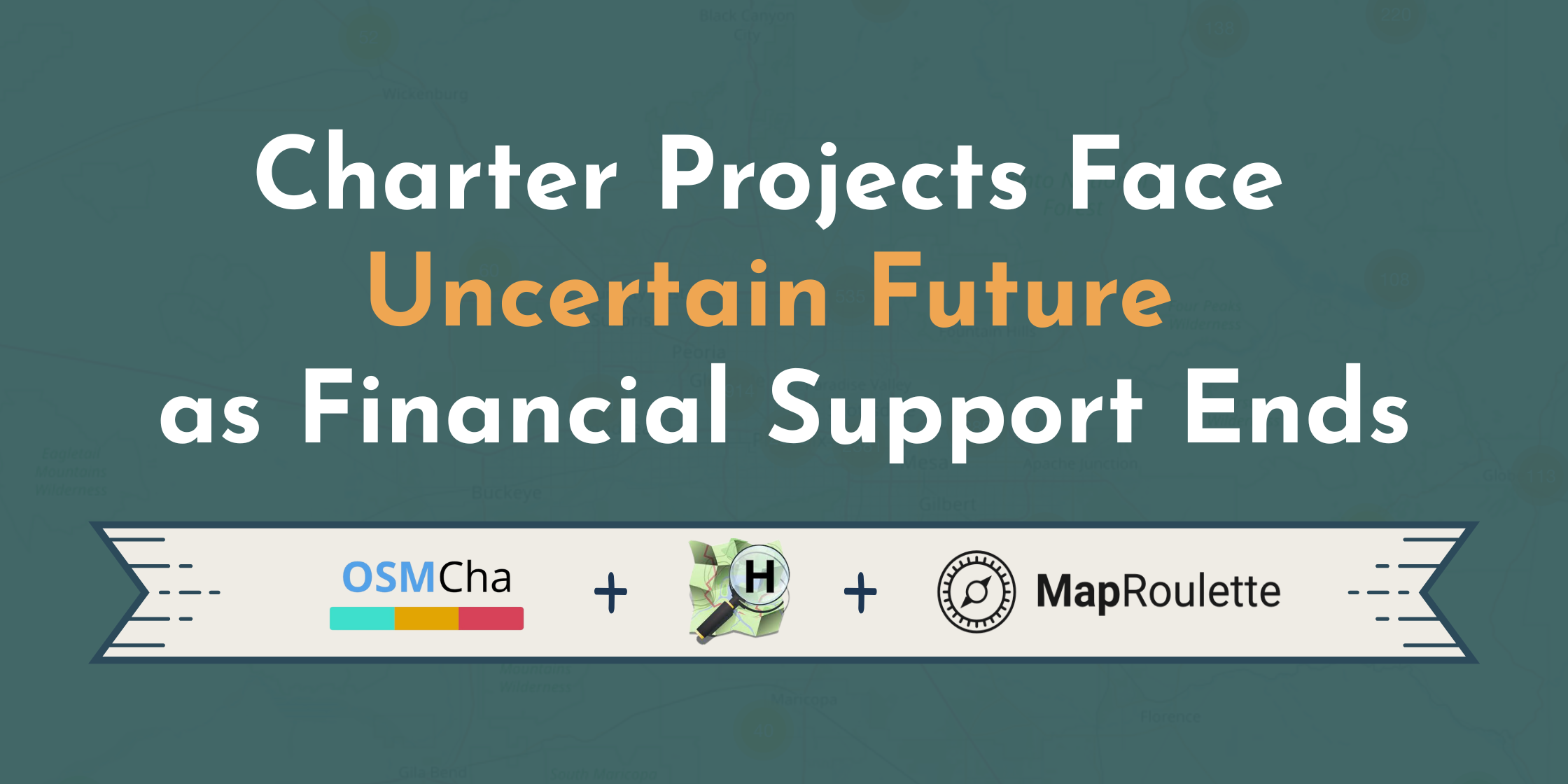Many of the best OpenStreetMap tools emerge organically as personal projects built by members of the global community. Informal structures can be great for getting a project off the ground, but at some point they become a barrier to its growth and sustainability. In 2020 OpenStreetMap US launched its Charter Project program to support the long-term stewardship of projects that are integral to the open mapping ecosystem. Through this program, community tools can grow within the 501(c)(3) framework of OSM US. The Charter Project program currently supports three amazing projects: OpenHistoricalMap, MapRoulette, and OSMCha.
In addition to offering a fiscal home for projects, the Charter Project program provides crucial ongoing technical, infrastructure, and engineering support. To that end, in 2024 OSM US was able to hire a dedicated Charter Project Engineer (Jake Low), made possible through donations from corporate partners. This funding enabled major technical improvements to our Charter Projects, including a new, faster backend for OSMCha, and making MapRoulette’s codebase and documentation more friendly to contributors. The funding also covered the significant server costs associated with running these applications, which have tens of thousands of active users.
Unfortunately, funding for the Charter Project Engineer role runs out on August 1, and has not been renewed by its original sponsors. Without further funding, we will be unable to continue making new technical investments in these Charter Projects. We will also have to take immediate steps to reduce their ongoing operating costs, such as downsizing servers or restricting use of APIs that support third-party integrations.
The Tragedy of the Commons
The Charter Projects represent shared infrastructure that generates enormous value for the entire OpenStreetMap ecosystem. MapRoulette and OSMCha together serve more than 40,000 OSM contributors a month. MapRoulette’s users have made more than 300,000 map improvements in 2025 alone, and OSMCha reviewers flag over 1,000 bad changesets each month. Data consumers rely on the OSM community to keep the map accurate and up-to-date, and the community relies on these tools to do so. In addition, companies integrate these tools directly into their data workflows: creating millions of MapRoulette tasks to focus community efforts on data improvements they care about, and using OSMCha’s APIs to identify harmful edits and filter them out of data they use when creating maps and other user-facing products.
Yet the responsibility for maintaining these tools falls almost entirely on volunteers and small nonprofits like ours. While some companies and organizations have stepped up as excellent stewards—and we’re deeply grateful for their support—many others haven’t yet recognized the need to invest in the digital infrastructure they depend on. It is disappointing to see so many companies extract millions of dollars in value from OpenStreetMap data and tools, but then refuse to reinvest a small fraction of that value to support basic maintenance for the software that they rely on.
The situation is hardly unique to OSM US’s Charter Projects; most tools and services in the OSM ecosystem are largely supported by volunteers or with extremely limited funding. The result is predictable: essential infrastructure slowly degrades, while those who benefit most contribute least. The volunteer ethos that makes OpenStreetMap extraordinary becomes a convenient excuse for companies to avoid paying for its maintenance.
The Cost of Inaction
Without dedicated engineering support, these projects will degrade. Services like MapRoulette, OSMCha, and OpenHistoricalMap do not run themselves. Servers will crash and need to be recovered. Dependencies will break, forcing patches. API keys will need to be rotated. What starts as delayed feature development becomes service instability, then unreliability, and eventually obsolescence.
For volunteer mappers, this means losing tools integral to their workflows. For companies, it means losing APIs and integrations their products depend on, and the erosion of the digital commons that supports their businesses. Funding continued development would cost far less than rebuilding these capabilities internally or licensing commercial alternatives.
Difficult Decisions Ahead
If we cannot secure funding for our Charter Projects, we will be forced to take actions that prioritize keeping these tools online and functional for our volunteer mapping community while scaling back support for commercial and high-volume users. This may include:
- Discontinuing access to APIs that support corporate workflows (e.g. bulk creation of challenges in MapRoulette or batch access to validation info in OSMCha)
- Eliminating technical support for commercial use cases
- Halting new feature development to focus on infrastructure stability and maintainability
These aren’t changes we want to make. They represent a step backwards for the ecosystem we’ve all worked to build. But without the funding to devote staff time to these projects, the alternative is worse: watching these critical tools slowly become unreliable and eventually unusable for everyone.
A Call to Action
The Charter Project program has shown what’s possible with dedicated funding. With proper support, these projects can thrive, evolve, and continue serving the OpenStreetMap community for years to come. Without it, we risk losing essential pieces of the software landscape that supports our digital commons.
Organizational Memberships are crucial to the sustainability of this program and of OpenStreetMap US. We are asking organizations that depend on the tools we maintain to become Members, and for existing Members to consider increasing their level of support or making an additional donation.
Our mission at OpenStreetMap US is to support and grow the OpenStreetMap project and community, both in the United States and beyond. This work benefits thousands of companies, big and small. We hope that these companies will choose to participate in the upkeep of the digital commons from which we all benefit.


